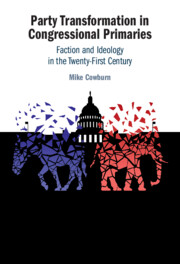Book contents
- Party Transformation in Congressional Primaries
- Reviews
- Party Transformation in Congressional Primaries
- Copyright page
- Contents
- Figures
- Tables
- Acknowledgments
- 1 Introduction
- Part I Primary Transformation
- Part II Party Transformation
- 4 A Most Likely Case
- 5 Selective Effect
- 6 Between-Election Adaptative Effect
- 7 Within-Election Adaptative Effect
- 8 Conclusion
- References
- Index
5 - Selective Effect
Do Noncentrist Candidates Perform Better in Primaries?
from Part II - Party Transformation
Published online by Cambridge University Press: 09 November 2024
- Party Transformation in Congressional Primaries
- Reviews
- Party Transformation in Congressional Primaries
- Copyright page
- Contents
- Figures
- Tables
- Acknowledgments
- 1 Introduction
- Part I Primary Transformation
- Part II Party Transformation
- 4 A Most Likely Case
- 5 Selective Effect
- 6 Between-Election Adaptative Effect
- 7 Within-Election Adaptative Effect
- 8 Conclusion
- References
- Index
Summary
Having shown that primaries can reorient parties in Chapter 4, this chapter tests the first mechanism through which primaries are said to contribute to partisan polarization: the selective effect of voter preferences. It therefore tests whether primary voters prefer noncentrist candidates, all else being equal. Through a set of four analyses it tests whether primary voters prefer candidates further from the center when they are presented with a comparatively moderate and polarized alternative, whether moderate incumbents are more threatened, whether candidates who emerge from (ideological and factional) primaries are more “extreme” than other candidates, and whether there is any relationship between turnout and nominee position. Taken together, the findings in this chapter demonstrate the absence of a select effect from primary voters in nonincumbent primaries and only a weak and substantively small effect when an incumbent is present, suggesting that the polarizing effect identified in Chapter 4 is largely independent from the preferences expressed by primary voters.
Keywords
- Type
- Chapter
- Information
- Party Transformation in Congressional PrimariesFaction and Ideology in the Twenty-First Century, pp. 136 - 163Publisher: Cambridge University PressPrint publication year: 2024

